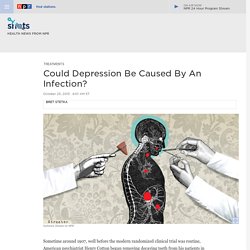

Scientists Theorize Inflammation May Trigger Some Mental Illnesses. Katherine Streeter for NPR Sometime around 1907, well before the modern randomized clinical trial was routine, American psychiatrist Henry Cotton began removing decaying teeth from his patients in hopes of curing their mental disorders.

If that didn't work, he moved on to more invasive excisions: tonsils, testicles, ovaries and, in some cases, colons. Cotton was the newly appointed director of the New Jersey State Hospital for the Insane and was acting on a theory proposed by influential Johns Hopkins psychiatrist Adolf Meyer, under whom Cotton had studied, that psychiatric illness is the result of chronic infection. Meyer's idea was based on observations that patients with high fevers sometimes experience delusions and hallucinations. Cotton ran with the idea, scalpel in hand. This 1920 newspaper clipping from The Washington Herald highlights Dr.
Following his death in 1933, interest in Cotton's cures waned. Symptoms Of Mental And Physical Illness Can Overlap Eye of Science/Science Source. Questions and Answers About Ankylosing Spondylitis. January 2013 This publication contains general information about ankylosing spondylitis (AS).

It describes what ankylosing spondylitis is, its causes, and treatment options. Highlights of current research are also included. At the end is a list of key words to help you understand the terms used in this publication. If you have further questions, you may wish to discuss them with your health care provider. Ankylosing Spondylitis: How to Get Support at Work and Home. By Jennifer Rainey MarquezWebMD Feature When Shannon Coleman was diagnosed with ankylosing spondylitis (AS), she was surprised by how hard the condition hit her.

“I’d had issues with my back for more than 10 years before I finally got a diagnosis in May 2014,” she says. “I thought I’d be prepared because I work in the health care field -- I’m a medical assistant at a spine clinic -- but I was struck by how debilitating it was to suddenly not be able to live my normal life as a working mom.” Recommended Related to Arthritis Adult-Onset Still's Disease Adult-onset Still's disease is an inflammatory disease that may affect many joints, internal organs, and other parts of the body.
Read the Adult-Onset Still's Disease article > > Getting Support With Ankylosing Spondylitis, Help at Home, Support at Work, Dealing With Pain and Fatigue. Most people with ankylosing spondylitis (AS) know about back pain.

But other areas of your body can swell and hurt, too. That’s what happened to 23-year-old Stefanie Gomez. C-Reactive Protein (CRP) A C-reactive protein (CRP) test is a blood test that measures the amount of a protein called C-reactive protein in your blood.

C-reactive protein measures general levels of inflammation in your body. High levels of CRP are caused by infections and many long-term diseases. But a CRP test cannot show where the inflammation is located or what is causing it. Other tests are needed to find the cause and location of the inflammation. Why It Is Done A C-reactive protein (CRP) test is done to: Check for infection after surgery. A special type of CRP test, the high-sensitivity CRP test (hs-CRP), may be done to help find out your risk of a heart attack and stroke. What Is Ankylosing Spondylitis? Diagnosis, Symptoms, and Treatment. Ankylosing spondylitis (AS) is a type of arthritis that causes lower back pain and stiffness.

Back pain from AS is not the same as more common types of back pain caused by things such as muscle spasms or slipped discs. AS back pain is caused by inflammation. It’s chronic, which means it is not a onetime thing. You will have it for a long time, but there are treatments to help lessen pain and stiffness. To get started, your doctor will look for some of these signs of inflammatory back pain. Recommended Related to Arthritis Arthritis Treatment Options You can probably remember a time when stairs weren't your enemy and you could bound up them without any painful protest from your joints.
Read the Arthritis Treatment Options article > > Ongoing back pain that is more likely to start when you are young (in your 20s and 30s). Continue reading below... Ankylosing Spondylitis Assessment: How Well Are You Living With AS? Eric Robertson, PT, DPT; spokesman, American Physical Therapy Organization; director, Kaiser Permanente Hayward Fellowship in Advanced Manual Orthopaedic Therapy.

Fernandez de Las Penas, C. American Journal of Physical Medicine Rehabilitation, July 2006. National Institute of Arthritis and Musculoskeletal and Skin Diseases: "Questions and Answers About Ankylosing Spondylitis: Will Diet and Exercise Help? " Sundstrom, B. On Diet and Ankylosing Spondylitis, Umea University, Sweden, 2011. Spondylitis Association of America: "Low Starch / London AS Diet," "Diet and Nutrition: An Overview," "Smoking Clouds Therapy In Spondyloarthritis, Worsens Outcomes," "Alternative Treatments," "Straight Talk onSpondylitis," "Treatment of Ankylosing Spondylitis and Related Diseases," "Exercise and Posture," "Medications Used to Treat Ankylosing Spondylitis.
" Averns, H.L. Wendling, D. Arthritis Research UK: "How Can I Improve My Sleep? " Living with Ankylosing Spondylitis. Pin by Myositis Support and Understanding on Autoimmune Disease: Reso… Uses, Side Effects, Interactions, Pictures, Warnings & Dosing - WebMD. Before using infliximab, tell your doctor or pharmacist if you are allergic to it; or to mouse proteins; or if you have any other allergies.

This product may contain inactive ingredients, which can cause allergic reactions or other problems. Talk to your pharmacist for more details. Before using this medication, tell your doctor or pharmacist your medical history, especially of: previous severe allergic reaction to this medication, tuberculosis (previous infection or positive skin test), past/recent/current infections (e.g., cold sores, Valley Fever), heart disease (e.g., heart failure), blood/bone marrow disorder (e.g., leukopenia, thrombocytopenia), nervous system disorder (e.g., numbness/tingling, seizures, multiple sclerosis), history of cancer (e.g., breast cancer, skin cancer, lymphoma), certain lung disorder (chronic obstructive pulmonary disease-COPD), liver disease (e.g., hepatitis B), light treatment for psoriasis (phototherapy). Remicade May Be Associated With Increased Risk of Lymphoma.